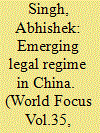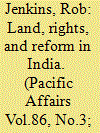| Srl | Item |
| 1 |
ID:
129687


|
|
|
|
|
| Publication |
2014.
|
| Summary/Abstract |
The Chinese Communist Party (CPP), which was established in 1929, successfully unified mainland China in 1949 and founded a new nation Peoples Republic of China (PRC). In the next three decades, the communist government tried to safeguard and built the nation in principle with Communist-Maoist ideology both economically and politically. During this period, the function of law and the legal system was to serve as an instrument for the ruling communist government at large. As a result, the scope for proper legal regime in China suffered significantly from the chaos and disorder caused by endless class struggle.
|
|
|
|
|
|
|
|
|
|
|
|
|
|
|
|
| 2 |
ID:
128535


|
|
|
|
|
| Publication |
2013.
|
| Summary/Abstract |
India's legal regime governing the compulsory acquisition of private land by the state for "public purposes" - centered on the Land Acquisition Act 1894 (LAA) - has long been criticized for breeding corruption and insufficiently protecting landowners and local communities. Attempts to overhaul the LAA have faced stiff resistance from powerful interests within and outside the state. When the United Progressive Alliance government took power in 2004, few would have guessed that it would seek to replace the LAA with legislation that imposes more rigorous standards for the compulsory acquisition of land and detailed rules for rehabilitating displaced people. Yet, in 2011 the government introduced the Land Acquisition, Rehabilitation and Resettlement Bill (LARRB). This article argues (1) that the LARRB displays certain distinctive characteristics shared by other rights-related statutes enacted under the UPA government; (2) that the emergence of this distinctive - and unforeseen - piece of legislation was driven largely by India's approach to creating Special Economic Zones; and (3) that both the LARRB's content and the process by which it was introduced have implications for debates of wider theoretical significance, including the increasingly hybrid nature of rights, and the desirability of combining insights from the literatures on "policy feedback" and "policy entrepreneurs."
|
|
|
|
|
|
|
|
|
|
|
|
|
|
|
|